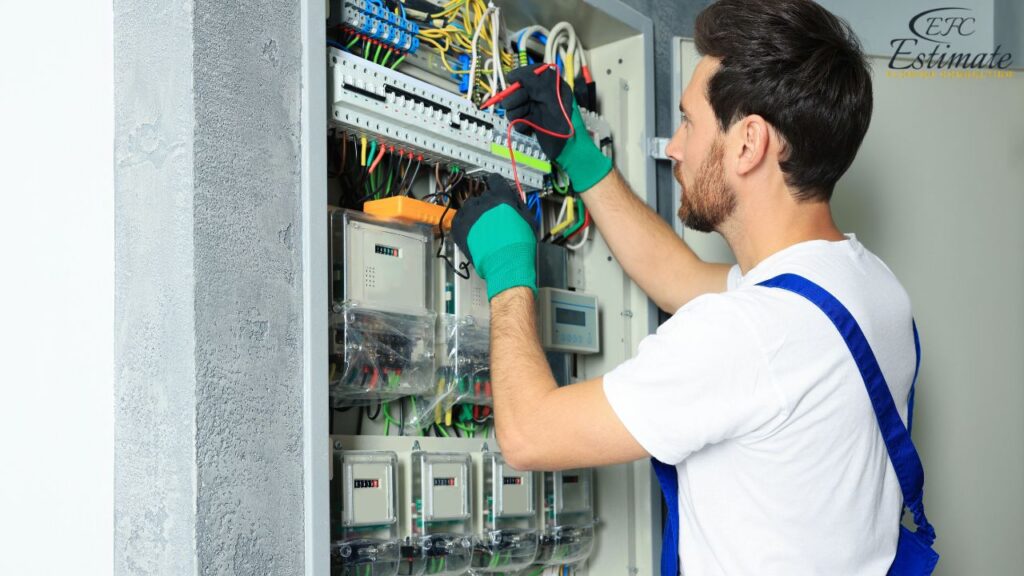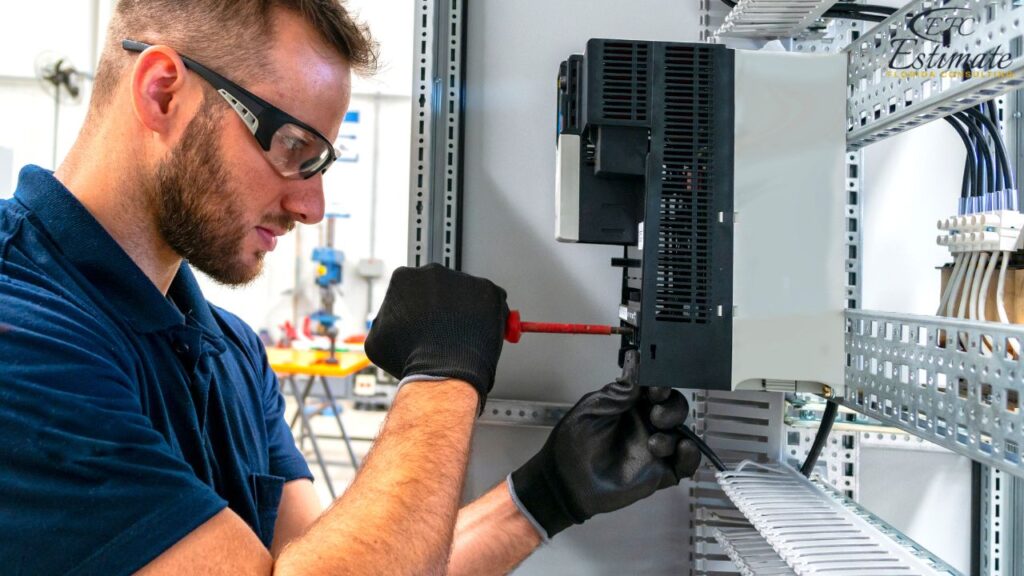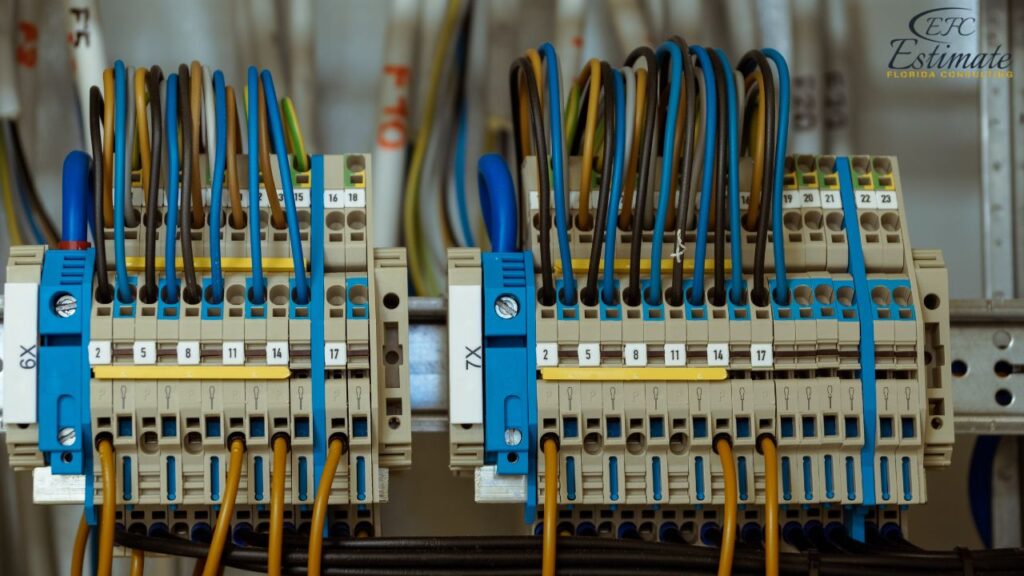Multi-Family Building Electrical Wiring Cost Estimator
Estimating the cost of electrical wiring for a multi-family building can be tricky due to various factors like building size, the number of units, and specific electrical needs. A Multi-Family Building Electrical Wiring Cost Estimator can simplify this process by providing a detailed cost breakdown. Typically, you might expect to spend between $10.40 and $19.50 per square foot, with more complex installations or high-end materials pushing the cost higher. For instance, a building with extensive wiring needs or advanced electrical systems might see costs reach up to $26 per square foot.

This tool accounts for wiring type, labor costs, and additional components like lighting and circuit panels, helping developers and property managers budget more accurately and avoid surprises. With a reliable estimator, you can ensure all your electrical needs are met efficiently, safely, and within your budget.
How Much Does It Cost to Wire a Multi-Family Building?
The cost to wire a multi-family building typically ranges between $10.40 and $19.50 per square foot, but costs can increase for more complex installations or high-end materials. For buildings requiring advanced electrical systems or custom features, expenses could climb to as much as $26 per square foot.
Here’s a breakdown of typical costs:
System Type | Cost per Square Foot |
Basic Setup | $10.40 – $14.00 |
Mid-Range Setup | $15.00 – $19.50 |
High-End Setup | $20.00 – $26.00 |
Key Factors Affecting Electrical Wiring Costs
Building Size and Layout
The size and layout of your multi-family building significantly influence wiring costs. Larger buildings require more materials and labor, while complex layouts with multiple floors and units add to the complexity and expense. For instance, wiring costs for a large multi-family building might range between $13.52 and $25.35 per square foot, depending on the complexity. Here’s a cost breakdown:
Building Size | Estimated Cost per Square Foot |
Small (Up to 5,000 sq ft) | $13.52 – $20.28 |
Medium (5,000 – 10,000 sq ft) | $15.60 – $22.10 |
Large (Over 10,000 sq ft) | $18.20 – $25.35 |
Electrical Load Requirements
The electrical load, or the amount of power each unit requires, varies depending on the number and type of appliances and systems installed. Higher electrical loads necessitate heavier gauge wiring and additional circuits, increasing costs. Typically, the cost might range from $14.56 to $27.30 per square foot for high-load requirements. A detailed breakdown is shown below:
Electrical Load | Estimated Cost per Square Foot |
Low Load (Basic appliances) | $14.56 – $20.80 |
Medium Load (Standard appliances and systems) | $16.90 – $24.05 |
High Load (High-end appliances and systems) | $19.50 – $27.30 |
Materials Used
The choice of materials impacts both the initial and long-term costs of electrical wiring. Copper wiring, though more expensive upfront, offers better conductivity and durability compared to aluminum. High-quality insulation and conduit materials also contribute to the overall expense. Costs for different materials are approximately:
Material Type | Estimated Cost per Square Foot |
Aluminum Wiring | $13.52 – $20.80 |
Copper Wiring | $16.90 – $27.30 |
High-Quality Insulation | $15.60 – $23.40 |
Labor Costs
Labor costs vary based on location, the complexity of the installation, and the experience of the electricians. In urban areas, labor costs tend to be higher due to the increased cost of living and demand for skilled workers. On average, labor costs might be:
Location | Estimated Labor Cost per Square Foot |
Rural Areas | $13.00 – $18.20 |
Suburban Areas | $15.60 – $22.10 |
Urban Areas | $19.50 – $27.30 |

Compliance with Building Codes
Adhering to local building codes and standards is essential for safety and legal compliance. These regulations often dictate specific wiring methods, materials, and installation practices, which can affect overall costs. Compliance-related costs might vary as follows:
Compliance Level | Estimated Cost per Square Foot |
Basic Compliance | $14.30 – $20.80 |
Standard Compliance | $16.90 – $23.40 |
Enhanced Compliance | $19.50 – $26.00 |
Estimating Electrical Wiring Costs
Accurate estimation is crucial for budgeting and financial planning. Here’s a step-by-step guide to help you estimate the electrical wiring costs for your multi-family building:
Conduct a Needs Assessment
- Identify Electrical Needs: Determine the number of outlets, switches, and special features required for each unit. This includes accounting for high-power appliances, security systems, and any unique wiring requirements.
- Consider Future Expansion: Plan for potential future upgrades or expansions to avoid costly rewiring later. Including extra capacity in your initial design can save you money in the long run.
Assessment Component | Estimated Cost |
Needs Assessment & Planning | $1,500 – $3,000 |
Gather Material Costs
- Research Prices: Obtain current prices for wires, panels, breakers, outlets, switches, and other components. Prices can vary widely based on quality and supplier.
- Quality Matters: Choose materials that balance cost and quality to ensure safety and durability. Investing in high-quality components can prevent costly repairs and replacements in the future.

Material Type | Estimated Cost per Square Foot |
Basic Materials | $12.00 – $17.50 |
High-Quality Materials | $17.00 – $25.00 |
Calculate Labor Costs
- Hourly Rates: Research average hourly rates for electricians in your area. Rates can vary based on location, experience, and the complexity of the installation.
- Project Complexity: Factor in the complexity of the wiring plan and any potential challenges that may arise. Complex projects with multiple units or intricate layouts will increase labor costs.
Labor Type | Estimated Cost per Square Foot |
Standard Installation | $15.00 – $22.00 |
Complex Installation | $20.00 – $30.00 |
Include Permit and Inspection Fees
- Local Requirements: Check local regulations to determine the cost of necessary permits and inspections. These fees can vary based on location and project scope.
- Plan for Delays: Allow for potential delays and additional inspections in your budget. Unexpected requirements or scheduling issues can add to the total cost.
Fee Type | Estimated Cost |
Permit Fees | $500 – $1,500 |
Inspection Fees | $500 – $500 |
Add Contingency
- Unexpected Expenses: Allocate a contingency fund (typically 10-20%) to cover unforeseen costs or changes in the project scope. This fund provides a buffer against unexpected expenses and ensures you stay within budget.
Contingency Level | Estimated Cost |
10% of Total Estimate | $5,000 (for a $50,000 project) |
20% of Total Estimate | $10,000 (for a $50,000 project) |
Cost Breakdown for Electrical Wiring in Multi-Family Buildings
Initial Planning and Design
Before any physical work begins, a detailed electrical plan is essential. This includes load calculations, circuit diagrams, and coordination with other building systems (e.g., HVAC, plumbing). Proper planning ensures that all electrical systems are designed to meet the building’s needs and comply with local codes. Hiring an electrical engineer or designer to create these plans typically costs between $1,300 and $3,900, depending on the project’s complexity and scale.
Item | Cost Range |
Electrical Planning & Design | $1,300 – $3,900 |
Get Acquainted with Electrical Installations
Electrical House Wiring
HVAC Installation
Electrical Wiring of 3 Storey House
Permits and Inspections
Obtaining the necessary permits and scheduling inspections are crucial steps in the electrical wiring process. Permits ensure that the installation complies with local building codes and safety standards. Fees for permits generally range from $130 to $650 per unit, while inspection costs are often included in the permit fees. It is important to account for these costs to avoid delays and ensure compliance with all regulations.
Item | Cost Range |
Permits & Inspections | $130 – $650/unit |
Materials
The choice of materials significantly impacts overall costs. Below is a detailed breakdown of material costs used in electrical wiring:
Item | Cost Range |
Copper Wiring | $0.39 – $0.91/foot |
Aluminum Wiring | $0.26 – $0.65/foot |
Conduits & Fittings | $0.65 – $2.60/foot |
Main Panels | $650 – $2,600 |
Circuit Breakers | $13 – $65 each |
- Copper Wiring: Offers superior conductivity and durability but at a higher cost. Ideal for high-demand applications.
- Aluminum Wiring: More affordable but less durable than copper. Suitable for less demanding applications.
- Conduits & Fittings: Protect wiring and ensure safe and compliant installations.
- Main Panels: Essential for distributing electrical power throughout the building.
- Circuit Breakers: Protect circuits from overload and short circuits.
Labor
Labor costs for electricians vary based on experience, location, and the complexity of the installation. Electricians typically charge between $65 and $130 per hour. The total labor cost can range from $13,000 to $39,000 for a standard multi-family building, depending on the size and complexity of the project.
Item | Cost Range |
Labor | $65 – $130/hour |
Total Labor Cost (10 units) | $13,000 – $39,000 |
Additional Components
Additional components, such as outlets, switches, and lighting fixtures, also contribute to the overall cost. Here’s a breakdown of these costs:
Item | Cost Range |
Standard Outlets & Switches | $1.30 – $6.50 each |
GFCI Outlets | $13 – $26 each |
Basic Lighting Fixtures | $65 each |
Elaborate Lighting Fixtures | $130 – $650 each |
Smoke & CO Detectors | $26 – $65 each |
- Standard Outlets & Switches: Basic components necessary for providing electrical access in each unit.
- GFCI Outlets: Required in areas where water and electricity may come into contact, such as kitchens and bathrooms.
- Basic Lighting Fixtures: Essential for general lighting in each unit.
- Elaborate Lighting Fixtures: Higher-end fixtures that add aesthetic value and may be used in common areas.
- Smoke & CO Detectors: Critical for safety, required in various locations throughout the building.

How to Use a Multi-Family Building Electrical Wiring Cost Estimator
A Multi-Family Building Electrical Wiring Cost Estimator simplifies the process of calculating wiring costs by considering a variety of factors such as wiring type, system complexity, and building size. By inputting key data into the estimator, property managers and developers can receive a detailed cost breakdown for their specific project.
For instance, if you’re wiring a mid-sized apartment complex with 15,000 square feet, using an estimator will help you predict costs between $200,000 and $400,000 depending on the materials and system specifications.
Tips for Reducing Electrical Wiring Costs
1. Optimize Design
Work with an experienced electrical engineer to optimize the design and layout of your electrical system. An efficient design can minimize material and labor costs while ensuring that the system is safe and compliant with building codes. Consider designing a modular system that can be easily scaled or adjusted as needed. This approach can be particularly beneficial for multi-family buildings, allowing for more flexibility and potential cost savings in future upgrades or modifications.
- Detailed Planning: Invest time in creating detailed plans that account for current and future needs. A well-thought-out design can reduce waste and prevent costly changes during construction.
- Layout Efficiency: Optimize the layout to minimize the length of wiring runs and reduce the number of required connections and junction boxes.
2. Bulk Purchasing
Buying materials in bulk can often result in significant discounts. Coordinate with your contractor to purchase all necessary materials at once. This approach not only saves money but also reduces the time spent on procurement and minimizes delays. Bulk purchasing can be particularly advantageous for items like wiring, conduits, and outlets, where economies of scale can be leveraged.
- Material Coordination: Work with your contractor to identify bulk purchasing opportunities for key materials. This can also help in managing inventory more effectively and avoiding shortages during the project.
- Supplier Negotiation: Negotiate with suppliers for better rates or bulk discounts. Long-term relationships with suppliers can also yield additional savings.
3. Competitive Bidding
Obtain multiple quotes from licensed electricians and contractors. Comparing bids can help you find the best balance between cost and quality. Ensure that each bid includes a detailed breakdown of costs to make accurate comparisons. This process not only helps in securing a fair price but also ensures that you are getting value for the services provided.
- Detailed Comparisons: Look beyond the total cost and analyze the detailed breakdown provided in each bid. This can help identify any hidden costs or discrepancies between bids.
- Contractor Reputation: Check references and reviews for each contractor to ensure they have a track record of quality work and reliability.
4. Energy-Efficient Systems
Investing in energy-efficient systems and appliances can reduce the overall electrical load, potentially lowering wiring costs and long-term energy expenses. Energy-efficient lighting and appliances can also contribute to overall cost savings by reducing the demand on your electrical system and lowering utility bills.
- Energy-Efficient Lighting: Use LED or other energy-efficient lighting options to lower both installation and operating costs.
- High-Efficiency Appliances: Install high-efficiency appliances that require less power, which can reduce the size and complexity of your electrical system.
Download Template For Electrical Wiring Project Breakdown
- Materials list updated to the zip code
- Fast delivery
- Data base of general contractors and sub-contractors
- Local estimators

5. DIY for Simple Tasks
For simple tasks like installing outlets and switches, consider doing it yourself if you have the necessary skills and knowledge. This can save on labor costs and give you more control over the project. However, always prioritize safety and compliance with local codes. Complex wiring and installations should be handled by professionals to ensure safety and code compliance. Performing DIY tasks can also be a good way to gain a better understanding of your electrical system.
- Safety First: Ensure you are familiar with local electrical codes and safety practices. Improper installation can lead to serious hazards.
- Professional Help: For complex tasks, such as wiring a multi-family building or installing high-voltage systems, always hire licensed electricians to ensure that the work is done safely and to code.
Conclusion
Accurately estimating the cost of electrical wiring for a multi-family building is essential for effective budgeting and project planning. By using a Multi-Family Building Electrical Wiring Cost Estimator, you can gain a comprehensive understanding of the factors influencing costs, such as building size, electrical load requirements, materials, and labor. The estimator provides a detailed breakdown, allowing developers and property managers to make informed decisions and avoid unexpected expenses. With careful consideration of all variables and by leveraging cost-saving strategies like bulk purchasing and competitive bidding, you can ensure that your electrical system meets both your budget and your building’s needs, while also adhering to safety and code compliance standards.
FAQs
The cost of electrical wiring for a multi-family building typically ranges between $10.40 and $19.50 per square foot. This can vary based on factors such as building size, electrical load, materials used, and installation complexity.
Key factors influencing the cost include:
- Building Size and Layout: Larger and more complex buildings require more wiring and labor.
- Electrical Load Requirements: Higher power needs increase the cost due to heavier wiring and additional circuits.
- Materials Used: Choices between copper and aluminum wiring, as well as insulation quality, affect costs.
- Labor Costs: Vary by location and installation complexity.
- Compliance with Building Codes: Adhering to local regulations can impact costs.
To estimate costs, consider:
- Planning and Design Costs: Typically between $1,300 and $3,900.
- Materials Costs: Includes wiring, panels, and other components.
- Labor Costs: Ranges from $65 to $130 per hour.
- Permit and Inspection Fees: Generally $130 to $650 per unit.
- Contingency Fund: Allocate 10-20% of the total estimate for unexpected expenses.
Effective strategies include:
- Optimizing Design: Work with a professional to create an efficient electrical layout.
- Bulk Purchasing: Buy materials in bulk to get discounts.
- Competitive Bidding: Get multiple quotes from licensed electricians.
- Investing in Energy-Efficient Systems: Use energy-efficient appliances and lighting to lower both initial and operating costs.
- DIY for Simple Tasks: Handle basic tasks yourself if you have the skills.
Labor costs for electricians depend on location and complexity:
- Rural Areas: $13.00 – $18.20 per square foot.
- Suburban Areas: $15.60 – $22.10 per square foot.
- Urban Areas: $19.50 – $27.30 per square foot.
Copper wiring generally costs between $0.39 and $0.91 per foot, while aluminum wiring ranges from $0.26 to $0.65 per foot. Copper is more expensive but offers better conductivity and durability.
Compliance with building codes ensures safety and legal adherence, which can impact costs. Basic compliance costs range from $14.30 to $20.80 per square foot, while enhanced compliance may range from $19.50 to $26.00 per square foot.
Permit fees usually range from $500 to $1,500, and inspection fees are often included in the permit fees. Overall, you should budget between $500 and $1,500 for permits and inspections.
Accurate budgeting involves:
- Detailed Planning: Include all costs for materials, labor, permits, and contingencies.
- Monitoring Expenses: Track and adjust your budget as needed throughout the project.
- Working with Professionals: Consult experienced electricians and engineers to avoid unexpected costs.
Google Reviews



Process To Get Electrical Wiring Cost Estimate Report
Here I am going to share some steps to get electrical wiring cost estimate report.
-
You need to send your plan to us.
You can send us your plan on info@estimatorflorida.com
-
You receive a quote for your project.
Before starting your project, we send you a quote for your service. That quote will have detailed information about your project. Here you will get information about the size, difficulty, complexity and bid date when determining pricing.
-
Get Estimate Report
Our team will takeoff and estimate your project. When we deliver you’ll receive a PDF and an Excel file of your estimate. We can also offer construction lead generation services for the jobs you’d like to pursue further.

